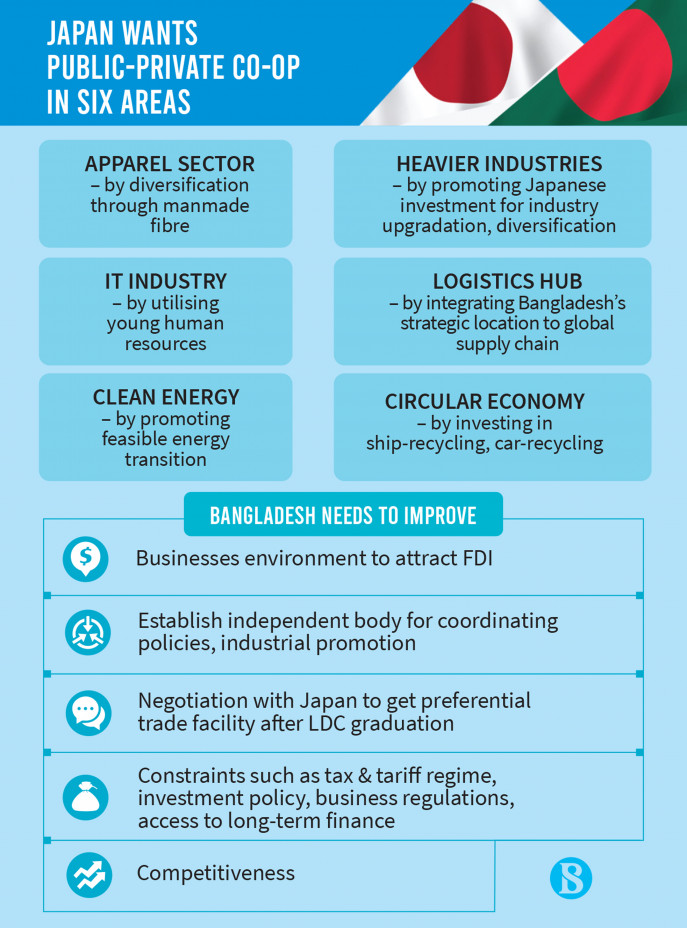
Japan wants to support Bangladesh in improving six potential areas to face the challenges of graduation from the least developed countries (LDC) status but has called on the government to improve the country’s business environment.
Japan’s Economy, Trade and Industry Ministry has identified the six areas – diversifying the apparel sector, becoming an IT giant, transitioning to clean energy and heavier industries, becoming a logistics hub, and moving towards a circular economy.
“Japan wants to work jointly with Bangladesh for energy security and climate change,” Minister Yasutoshi Nishimura said while addressing a summit titled “Bangladesh-Japan economic relations for the next 50 years: For the industrial upgradation of Bangladesh” in Dhaka on Sunday.
Officials of the Japanese ministry said to achieve progress in these areas public-private needed to work together.
The ministry’s Deputy Director General Toshiki Wani mentioned that they focused on these six areas as potential fields of Japan-Bangladesh public private cooperation.
The Japan External Trade Organization (Jetro), the Bangladesh Investment Development Authority (Bida), and the Federation of Bangladesh Chambers of Commerce and Industry (FBCCI) jointly organised the summit.
The Japanese economy minister called on Bangladesh to work towards upgrading industrial manufacturing and developing the IT sector.
Over 300 Japanese companies have invested in Bangladesh and more such investment is coming, he said.
“In light of the last 50 years’ relations, we need to set the direction for the next 50 years,” he added.
Attending the event, Industries Minister Nurul Majid Mahmud Humayun urged Japanese businesses to invest in fertiliser, agriculture, chemical, footwear and automobile industries.
The minister also gave assurance of proving all types of support required.
Bangladesh wants to start negotiations to sign a deal with Japan to get its market access after LDC graduation, Tipu Munshi said, adding that “We don’t wait for graduation”.
He said that the Economic Partnership Agreement (EPA) is in progress to take Japan-Bangladesh trade relations to new heights.
“The first round of discussion has already been held in Japan and the second round of discussion will be held in Dhaka on July 25-26. Both countries have agreed to execute this agreement soon,” said the commerce minister.
Also present at the event, ICT Division Minister Zunaid Ahmed Palak said “We have demographic dividend benefits and Japan has an ageing population problem.”
“Here is the scope for both countries to work together,” Palak added.
He also mentioned that a number of Bangladeshi IT professionals are serving Japanese companies both in Japan and Bangladesh.
Business leader request for energy cooperation
FBCCI president Md Jashim Uddin at the summit urged Japan for energy cooperation as it is a very crucial issue in Bangladesh.
“By investing in clean energy technologies, we can not only bolster our energy security but also contribute to global efforts in mitigating climate change,” he said.
BIDA Executive Chairman Lokman Hossain Miah, urged Japanese investors to invest in Bangladesh.
“Bangladesh is one of the most profit making countries in the world as it is a market of 170 million population,” he said.
Similar energy vision of Japanese firms
In a panel discussion at the event, Japanese investors said they have the same kind of vision as Bangladesh.
They welcomed the government’s move to adopt an integrated energy and power master plan putting importance on renewable and advanced technology.
“We would like to work together with Bangladesh’s energy sector to contribute to the further development of the country,” said Shinichi Nagata, general manager at Sumitomo Corporation Dhaka Office.
He said that renewable energy technology like ammonia and hydrogen is the future of Bangladesh.
Bangladesh needs to accelerate the development of the terminal facility to receive LNG as its local gas reserve is decreasing, he stressed. “This is very necessary for sustainable energy transition and sustainable economic growth.”
Myung Ho Lee, country representative of Mitsubishi Corporation Dhaka Branch Office said “It is very important that the national master plan is very realistic and achievable instead of being a fancy one.
“This will help Japanese companies together with Bangladeshi companies and they apply needed programmes for the further hydrogen and ammonia project.”
Yoshiro Kaku, chief representative of the New Energy and Industrial Technology Development Organization (Branch Office in India) said his company desires to be the first to implement the ammonia project in Bangladesh.
The company along with some other countries started a study in March 2022 in order to achieve 20% liquid ammonia co-firing and higher co-firing ratio up to 100%, single-fuel firing at the Adani Power Mundra Coal Fired Power Plant.
MoUs signed at the summit
Bangladesh and Japan signed three memorandums of understanding (MoUs) at the summit to enhance bilateral trade and investment between both countries.
The Bangladesh Special Economic Zone Ltd (BSEZ) signed the first MoU with Bangladesh IRIS Co Ltd—a Bangladesh-Japan joint venture company promoting education for children—to purchase land and get the right to use the land inside BSEZ of phase 2.
The BSEZ signed a second MoU with Brac Kumon to provide school going children near the BSEZ areas with the education opportunities.
The commerce ministry signed the third MoU with Jetro to cooperate in promotion and exchange of trade information and to enhance the capacity of Bangladesh’s commerce ministry officials.

